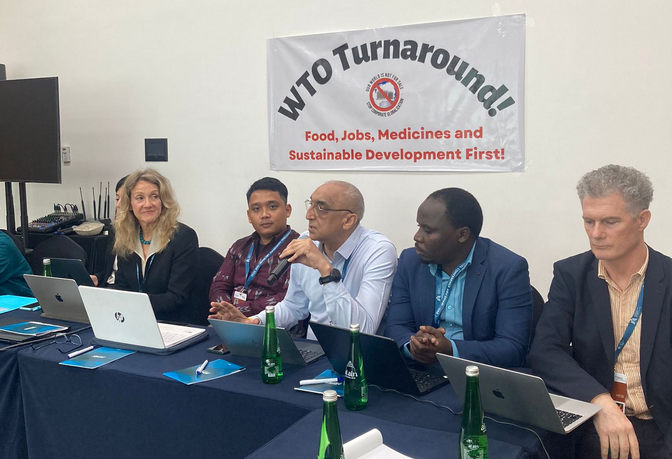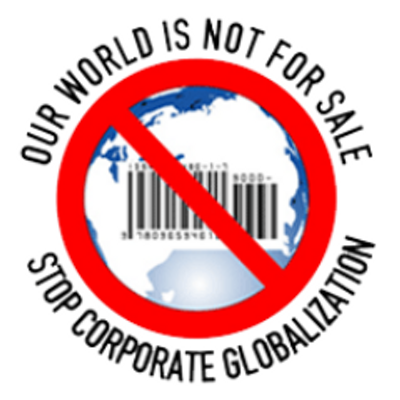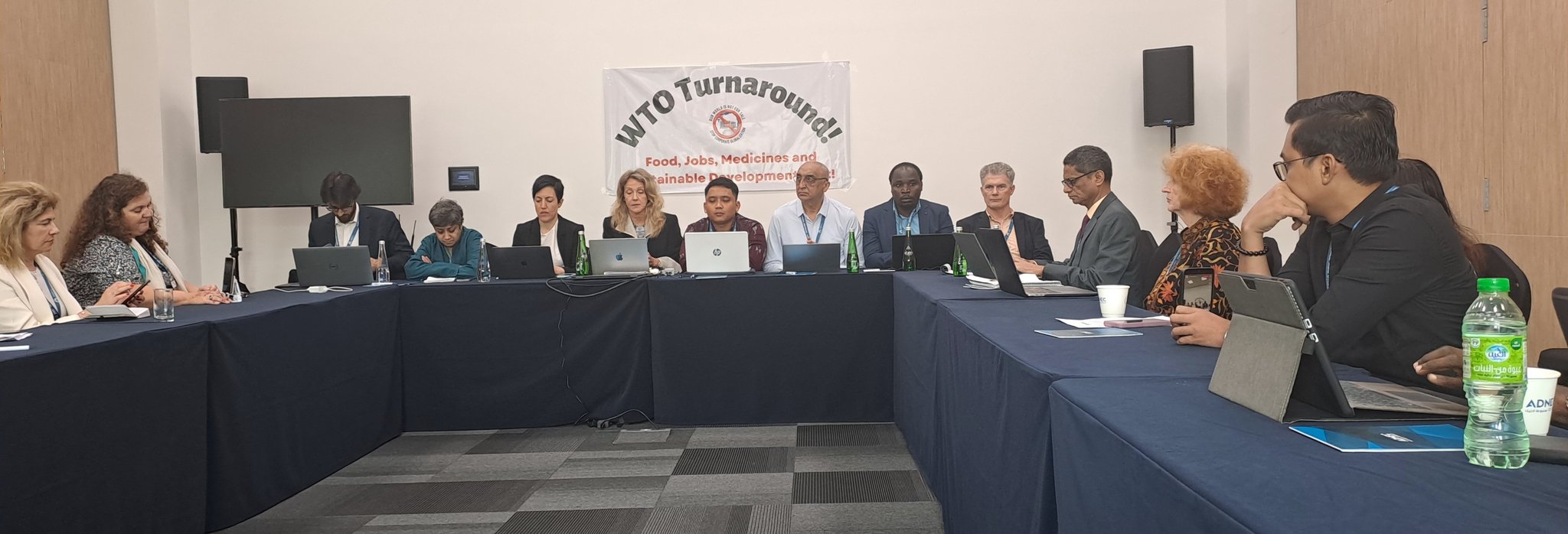
Voices from the South Newsletter

Our World is Not For Sale
PART 1: “What’s at Stake“
By Deborah James, Facilitator OWINFS
The WTO Ministerial has now kicked off in Abu Dhabi, civil society and academic experts from around the world share what’s at stake at this biggest WTO meeting in years. Main items on the agenda include the long-running fisheries subsidies negotiations, agriculture rules for food security and a set of development proposals that developing countries have been fighting for since the WTO’s inception.
At stake is a fight between two visions of what role the WTO, as the world’s most powerful rule-making body in the global economy, should play. Should the institution expand as an even more corporate-influenced body, with rich countries allowed to set agendas, impose negotiation mechanisms in their favor, and leave poorer countries — and multilateralism itself — in the dustbin of history? Or should members of the institution recognize the constraints that the current rules place on developing economies, including the harm caused to workers, farmers, and the global environment, and increase flexibilities so that these countries can use trade for their development?
Global civil society, working together through the Our World Is Not for Sale (OWINFS) global network, has long advocated for a complete turnaround in the direction of multilateral trade rules. Global rules should allow countries to safeguard food security, promote good jobs and livelihoods, ensure public interest regulatory oversight, and engage in sustainable development — and not constrain these in the interest of “trade” beneficial to large multinational exporters.
In the interim, the network calls for “Social Impact Assessments” of the existing rules, including on inequality, employment, food security, financial stability, public services, access to medicines, and other issues, with a view to implementing changes to existing rules which are necessary to ensure a multilateral trade system that is sustainable, socially just, and democratic.
In the immediate term, for MC13, the path towards a farmer-, fisher-, worker-, environment- and development-friendly outcome is clear:
- Stop pursuing a distorted WTO reform agenda (efforts appearing to undermine developing countries’ collective bargaining power, rather than enhancing responsiveness to members’ developmental needs)
- Conclude the so-called “Development Agenda” (a 23-year series of negotiations on flexibility for developing countries that has been blocked by developed countries)!
- On Joint Statement Initiatives (JSIs) (new “critical mass” agreement efforts to try to bypass blockages in the WTO): Stop pursuing plurilateral agreements at the expense of addressing real multilateral concerns in the multilateral body of the WTO. If it’s digital, environment, medium or small enterprises (MSMEs), gender, Investment Facilitation, or Domestic Regulation, they are all harmful to food, livelihoods, and sustainable development.
- Stop using “sustainability” to hide neo-liberal policies, and instead look at how trade contributes to climate change and what changes we can make to limit and reduce that damage.
- Agree to a real waiver for COVID-19 vaccines, therapeutics and diagnostics and the TRIPS non-violation complaint moratorium.
- Oppose the moratorium on customs duties on e-transmissions (an agreement since 1998 to not impose customs duties on transactions that take place across borders over the Internet); it’s just Big Tech tax evasion.
- On Agriculture: Agree to an uncomplicated permanent solution for public stockholding, agree to a Special Safeguard Mechanism, oppose the Cairns group (coalition of countries representing agribusiness exporters) demands for more “free trade” in agriculture, and allow poor countries to protect their domestic food production.
- On Fisheries: Allow developing countries to expand their artisanal fish production for food security and livelihoods and uphold existing United Nations Convention on the Law of the Sea (UNCLOS) rights for members. Countries that caused global overfishing should have to reduce their fleets and their subsidies, not just face restriction on where they are now.
We are a long way off of the true transformation of the global trade rules system that is desperately needed. But now more than ever, it’s key that a well-organized civil society is present at the WTO’s MC13 to help developing countries resist the rich-country push towards an even more corporate WTO.
This text is an edited and condensed version of the article “What’s at Stake at the WTO’s 13th Ministerial Conference This Month in Abu Dhabi?,” published by Center on Economic Policy and Research (CEPR) in February 2024. The full article, including more in-depth analysis on the demands listed above, can be accessed here.
Global rules should allow countries to safeguard food security, promote good jobs and livelihoods, ensure public interest regulatory oversight, and engage in sustainable development — and not constrain these in the interest of “trade” beneficial to large multinational exporters.
– Deborah James (OWINFS)
PART 2: “NGOs call for free speech to be restored at WTO Ministerial in UAE”
Press Release from OWINFS (26 February 2024)
(Abu Dhabi) NGOs filed formal complaints with World Trade Organization (WTO) officials and key Member nations on the first day of the WTO’s 13th Ministerial Conference (MC13) in Abu Dhabi, United Arab Emirates, due to the unannounced and unprecedented removal of civil society’s rights to freedom of speech and political expression at what is being billed as WTO’s most “open, transparent and inclusive process“ ever.
VIDEO: In-person press briefing with civil society present at WTO’s MC13
Previous WTO ministerials have allowed civil society participants to distribute information and analyses, take photos, display banners, and other forms of engagement, but Abu Dhabi’s world trade summit has so far seen:
- During the WTO Director General’s plenary speech on “inclusion”, Mr. K.V. Biju, a farmer leader from India and accredited NGO representative was in front of Room 9 and saw a journalist he knew and shared a letter with him from Indian farmers. He was grabbed by a security person, frisked, and taken to a room where he was held for close to two hours.
- Deborah James, facilitator of civil society network Our World Is Not For Sale (OWINFS), was told by the Head of External Relations of the WTO that the Emirati security officials have said that banners and demonstrations are banned, and anyone leafleting will be subject to arrest. It is not clear what leafleting includes: distributing of articles, press releases, reports, flyers?
- Security officials the previous day took away A3 posters without explanation. Also, people were stopped from handing out press releases.
- On opening day, civil society groups were told that we could not take photos inside or outside of the building, when even the WTO’s informational Powerpoint presentation says that filming and photography in public areas of the conference are allowed.
- None of these restrictions were included in the WTO’s informative Powerpoint presentation in advance.
- At previous WTO activities, civil society groups have never been told what not to say and what not to do.
- Civil society groups sent a letter (pasted below) to the Director General earlier today, calling on her to address these issues as a matter of urgency. We have yet to receive a response.
The current degree of repression of policy advocacy work has never happened before inside a WTO conference. It is the obligation of the WTO to ensure that the rules of the WTO regarding advocacy, free association and free speech are upheld in the venue of their meetings as part of basic transparency. It is the responsibility of the WTO to ensure that MC13 can be undertaken in a transparent and inclusive manner.
Fikerman Saragih, from The People’s Coalition for Fisheries Justice (KIARA) said: “As a representative of 2.4 million fisherfolks and 3.9 million fisherwomen in Indonesia, I have come to MC13 to make their voices heard, but these unacceptable and unprecedented restrictions on peaceful activities by civil society organizations at MC13 have silenced us.”
Professor Emeritus Jane Kelsey stated: “I have been to many WTO ministerials and have never encountered such a determination to silence critical voices. The WTO must and will be held accountable for its decision to hold the MC13 here without securing guarantees that independent civil society can be heard. It exposes the presence of ‘inclusivity’ for what it is – a public relations sham to gloss over the reality of power politics in the WTO, both inside and out.”
Rodolfo Lahoy from IBON International, said: “Economic rights cannot be fulfilled without the active voices of civil society and social movements. Any rhetoric of development or sustainability the WTO is fundamentally incoherent and impossible if civil society voices, especially from the South, cannot even raise the concerns and narratives of their peoples and constituencies. No development for us, without us.”
Victor Menotti, from Demand Climate Justice, said: “The UAE hosted UNFCCC’s COP28 only three months ago and so is very, very familiar with the international standards of civil society participation, freedom of speech and political expression established at global summits for rule-making, yet Abu Dhabi appears to be paranoid about any critical analyses of proposed WTO decisions that will impact million of peoples lives beyond its borders.”
Civil society calls on WTO members to insist that civic spaces be respected, and that we are allowed to perform civil society’s roles and pursue its modalities of engagement, including being able to have peaceful demonstrations, display banners, and give out flyers and information to delegates and press.

The “Our World Is Not For Sale” (OWINFS) is a network of organizations and social movements worldwide fighting the current model of corporate globalization embodied in global trading system. OWINFS is committed to a sustainable, socially just, democratic and accountable multilateral trading system. www.ourworldisnotforsale.net
